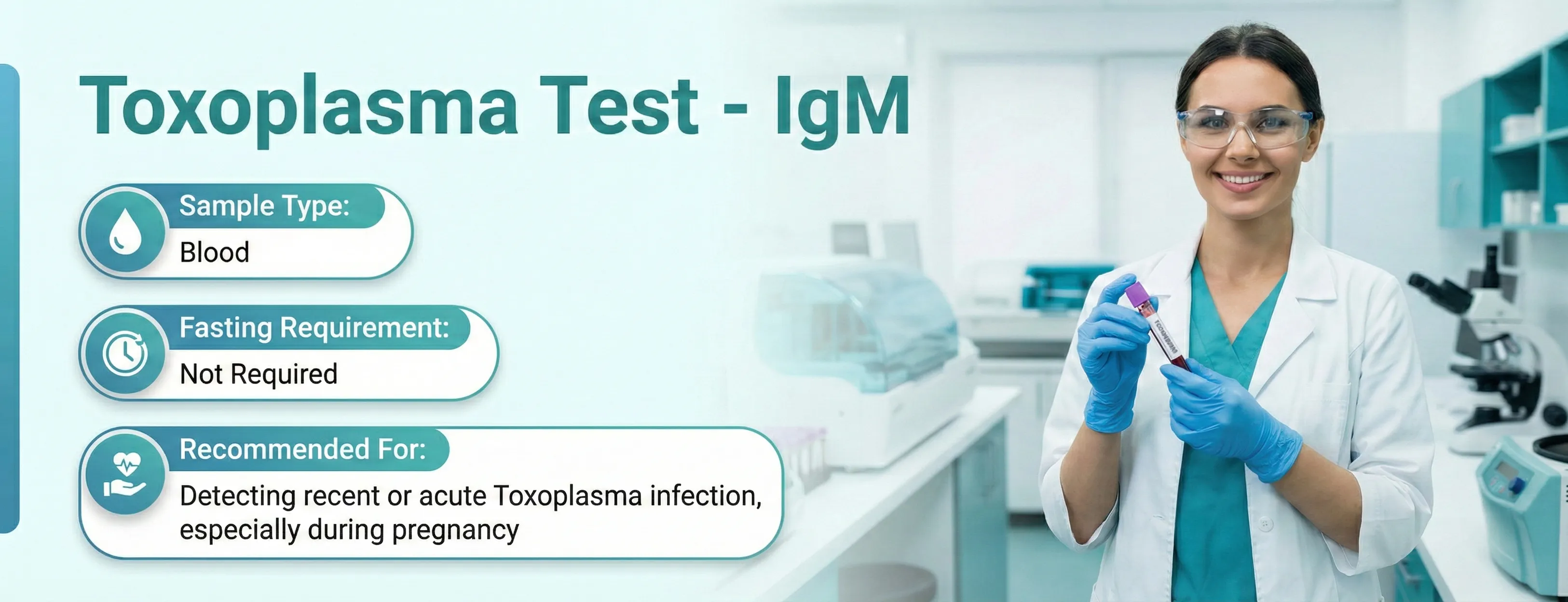7+ orders placed in your location
100% NABL & ISO Certified Lab • 100% Accurate Reports
Toxoplasma Test - IgM
T. gondii, Toxoplasma gondii, Toxoplasma IgM Antibody Assays, Toxoplasma IgM Antibody Serum, Toxoplasmosis, Torch, TORCHS, Toxoplasmosis IgM
- SummaryThe Toxoplasma IgM test detects IgM antibodies against Toxoplasma gondii, a parasite that causes toxoplasmosis. A positive result suggests a recent or active infection, which is especially important during pregnancy due to the risk of transmission to the fetus. The test is done using a blood sample, and fasting is not required. Read more
- Reports Within20 HrsView Sample Report100% NABL & ISO Certified Labs
- SampleBlood
- AgeAll Age Group
- GenderMale and Female
- FastingNot Required
PharmEasy Promises
Know More About The Test
A quick info on Toxoplasma Test - IgM
Overview
A protozoan parasite, toxoplasma gondii, can live inside cells. It can infect humans as well as a variety of other lifeforms. Toxoplasmosis is a parasitic infection that can induce flu-like symptoms. Many warm-blooded creatures, such as birds and mammals, can transmit it.
Infected definitive hosts (cats) excrete oocysts in their faeces, which mature and become infectious in the soil. Humans contract toxoplasmosis through:
- Ingesting cat faeces-contaminated food or drink.
- By eating undercooked meat containing live oocysts.
- Drinking unpasteurised goat's milk.
- Eating contaminated meat causes toxoplasmosis.
- Consumption of parasites in raw meat.
- Casual handling of cat litter.
- Contaminated vegetables and other foods.
- Ingestion of parasites in the soil by dirt-eating children infects humans.
- It can also be passed down through the placenta during pregnancy.
During the acute stage of acquired maternal illness, parasites can pass through the placenta and cause congenital toxoplasmosis. The risk of foetal infection varies by the month of maternal infection during pregnancy. Congenital toxoplasmosis becomes more common as the pregnancy proceeds.
The Toxoplasmosis Antibody Test is a blood test that analyses specific immunoglobulins. Antibodies are proteins produced by the immune system to combat antigens of a protozoan called Toxoplasma gondii. The first antibody produced by the body to fight toxoplasmosis is immunoglobulin M (IgM). It is found primarily in the blood and lymph fluid (a clear white fluid rich in white blood cells). While it can detect an infection early on, it only lasts for around 18 months at most.
Congenital toxoplasmosis causes severe systemic or neurologic disease in around 20% to 30% of infants infected in pregnancy. Approximately 10% have only eye involvement and the rest are asymptomatic at birth. Premature delivery and consequent neurologic, intellectual and hearing abnormalities may arise from infection.
Adults, especially immunodeficient or immunosuppressed adults, are usually asymptomatic when infected with this parasite. But in symptomatic cases, the affected person often shows inflammation and other nonspecific symptoms. It is difficult to make a precise diagnosis due to these symptoms that are similar to those of many other illnesses.
Moreover, the symptoms of toxoplasmosis could be fatal in people who are immunodeficient or immunosuppressed. In many cases, these infections affect the central nervous system due to the reactivation of previous infections.
A research study of toxoplasma gondii in Indian women of childbearing age shows the prevalence rate of this infection is highest in South India with 37.3% and the lowest in West India with 8.8%.
Sample Type
The results of Toxoplasmosis IgM Tests are based on analysis of blood samples. A blood sample can be collected at a hospital or laboratory. Usually, blood is extracted from an arm vein. For more specific instructions, consult the concerned doctor.
An amniotic fluid (a protective liquid around a baby during pregnancy) is also used to detect toxoplasmosis infections in the unborn child if the mother is diagnosed positive for toxoplasmosis antibodies.
Risk Assessment
Toxoplasma Encephalitis, Ocular Toxoplasmosis, Congenital toxoplasmosis
What does this test detect?
The Toxoplasma IgM antibodies are produced as a reaction to T. Gondii infection. This test measures levels of these IgM antibodies. Toxo antibodies are elevated during the toxoplasmosis and a few months after the infection.
Toxoplasmosis testing is suggested for:
- Women who are trying to conceive.
- Newly pregnant women should determine if they have a history of parasite exposure.
- The amniotic fluid test is essential in an unborn baby whose mother has a history of exposure to T. gondii.
- Those who have symptoms of toxoplasmosis.
- People with weak immune systems and experiencing flu-like symptoms.
Toxoplasmosis is requested if the doctor suspects any of the conditions listed above.
Indications for Toxoplasma IgM Test
Most women with toxoplasmosis infection are asymptomatic. Although the Toxoplasmosis IgM Test is indicated for those with the following:
Lymphadenopathy - The clinical symptom of recent infection is lymphadenopathy. Typically, there are enlarged nodes that are distinct, non-tender and without pus. Some other infections are polymyositis, dermatomyositis and chorioretinitis.
Some other symptoms related to infection are:
- Flu-like symptoms
- Fever
- Chills
- Fatigue
- Headache
- Eye inflammation and fever
- Diarrhoea
- Vomiting
- Weight loss
- Neurological symptoms
- Jaundice
- Difficulty in breathing due to pneumonia
- Lethargy, Tiredness
- Anorexia
The Toxoplasma IgM Test determines the presence of antibodies to the parasite T. gondii. Doctors also recommend toxo IgM testing to monitor the course of treatment.
Although, the result of a single sample is insufficient evidence for a recent infection diagnosis. IgM antibodies to T gondii may be missing if a serum sample is taken too soon after infection. Whenever this is suspected, a second serum sample is taken and the test is repeated after two to three weeks.
How frequently should you take this test?
The frequency of the Toxoplasma IgM Test is dependent on the symptoms and interpretation by the doctor.
The result of a single serum sample is insufficient evidence for a recent infection diagnosis. IgM antibodies to T gondii could be missing if the sample was taken too soon after infection.
In this case, a second sample is taken and the test is repeated two to three weeks later.
If the test results are inconclusive, they should be repeated on a second sample three weeks following the initial test.
Test Preparation
Before the Test
Before undergoing the Toxoplasma IgM Test, your doctor will likely not require any special precautions. However, if you need to take this test along with another that requires special preparation, your doctor may recommend fasting for a specific time. Always consult your doctor before undergoing any test to get advice.
During the Test
For the Toxoplasma IgM Test, a phlebotomist will draw a blood sample from a vein of your arm. Here's what will happen during the test:
- The likely puncture site will be sterilised with antiseptic.
- A tourniquet will be secured around your arm to make your veins stand out.
- A needle will be inserted into a chosen vein to draw the blood. This may cause a brief pinch for a few seconds.
- The blood will be collected in a vial/small test tube, and a label will be affixed with your details.
After the Test
Following the blood collection:
- A bandage will be applied to stop the bleeding at the insertion site.
- You may notice bruising at the puncture site. If you feel lightheaded, you should sit and rest for a few minutes.
- If you notice persistent bleeding, pain, or if rashes develop at the puncture site, contact your doctor.
Parameters
The Toxoplasma IgM Test measures the presence of antibodies to the T. Gondii parasite in the blood. These values give an idea about the presence of IgM antibodies, a sign of an immune response to infection. The toxoplasma IgM test result is expressed as positive or negative, which is an indicator of toxoplasma infection.
Ranges
The Toxoplasma IgM Test identifies the presence and absence of IgM antibodies. The readings will be within normal ranges if the person does not have the infection.
The range of Toxoplasma IgM tests are:
- Equivocal is 2 to 3 IU/ml
- Non-reactive is equal to or greater than 0.6 (IgM)
- Positive is above 3 IU/ml
The normal values and reference ranges of the test may vary from lab to lab. Please refer to the ranges mentioned in the report and consult a doctor to understand the interpretation of lab reports.
Test Result Interpretation
The detection of IgM-class antibodies to T. gondii helps in screening for toxoplasma gondii infection. According to the FDA, IgM-positive screening assay results should be validated by a Toxoplasma reference laboratory.
The findings of a Toxo test are equivocal, positive or negative. Positive results indicate higher IgM antibodies and negative results indicate lower numbers of IgM antibodies.
Equivocal Toxoplasma IgM Test:
- Toxo IgM status not determined.
- Obtain an extra sample for re-testing within a reasonable timeframe (two to three weeks).
Positive Toxoplasma IgM Test:
Toxo IgM antibody detected, which may indicate a current or recent infection.
- A single IgM-positive result indicates that the person has been exposed to Toxoplasma gondii in the past.
- Identifies the patient has a history of exposure to Toxoplasma gondii.
- The patient has a current infection with Toxoplasma gondii.
- Suffering from active toxoplasmosis.
- An acute infection that could have occurred up to a year ago.
Negative Toxoplasma IgM Test:
- Toxoplasma IgM test findings that are negative suggest that the person is immune to toxoplasmosis.
- A single negative result from this assay does not rule out toxoplasmosis, as the sample may have been obtained too soon after infection before detectable antibodies had grown.
The single negative result cannot rule out toxoplasmosis.
For patients at high risk of infection, doctors may find it essential to repeat the test. Only a combination of clinical and serological evidence can diagnose a recent Toxoplasma gondii infection.
Risks and Limitations
The Toxoplasma IgM test, a commonly performed blood test, carries very few risks of complications. Consult your physician if you experience:
- Persistent bleeding at the puncture site
- Redness, swelling, or pain at the needle insertion site.
Limitations of the test
- Potential inaccuracies due to equipment malfunction or human error
- Misinterpretation of markers which may lead to an inaccurate reading and report.
Was This Test Information Helpful?
Please rate your experience
References
People Also Ask
What is the difference between Toxoplasma IgG and IgM?
How long does Toxo IgM stay positive?
What is the normal range for toxoplasmosis IgM?
Have any doubts? Ask us.
Ask us anything about the Toxoplasma Test - IgM to understand it better
Explore More at PharmEasy
Top-Selling Healthcare Products
Top-Searched Medicines
We provide trusted, expert-curated health content to support better awareness,prevention, and care.
Backed by experienced doctors, medical experts, and strict editorial standards.


